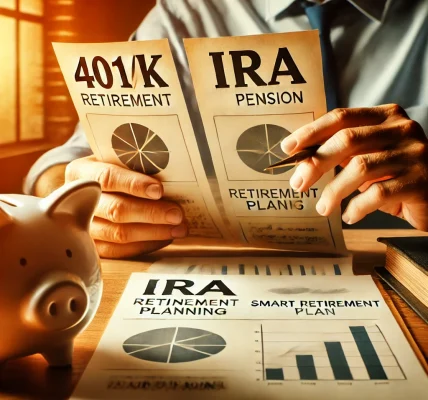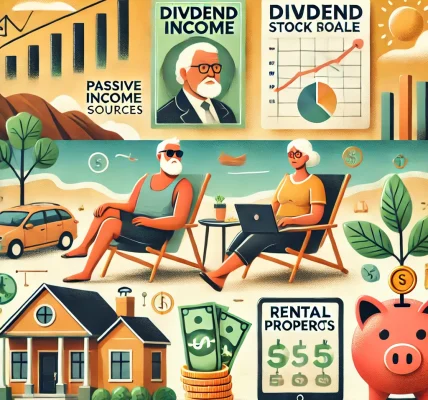Introduction
Choosing the right retirement plan is one of the most crucial financial decisions you’ll ever make. While both government and private retirement plans offer benefits, each comes with its own set of pros and cons. Understanding these differences can help you make an informed decision based on your financial goals, job security, and risk tolerance.
In this article, we’ll compare government and private retirement plans, covering key factors like security, flexibility, returns, and tax benefits to help you determine which is best for you.
What Are Government and Private Retirement Plans?
Government Retirement Plans
Government-backed retirement plans are offered by public sector employers (such as the federal or state government). These plans include pensions, social security, and other benefits funded through government programs.
✔ Examples:
- Social Security (USA)
- National Pension System (NPS) (India)
- Public Employee Pensions (UK, Canada, Australia, etc.)
Private Retirement Plans
Private retirement plans are offered by private sector employers or financial institutions. These plans include 401(k) plans, IRAs, Roth IRAs, and employer-sponsored pension schemes in corporate jobs.
✔ Examples:
- 401(k) and Roth 401(k) (USA)
- Self-Employed Pension Plans
- Private Annuities & Investment Funds
Both types of plans have advantages and drawbacks, which we will explore below.
Pros and Cons of Government Retirement Plans
✅ Pros of Government Retirement Plans
✔ Guaranteed Income in Retirement – Government plans often provide a fixed pension or social security benefits, ensuring financial stability in old age.
✔ Lower Investment Risk – Since these plans are government-backed, they have minimal risk compared to market-driven private plans.
✔ Employer Contributions – Public employees often receive pension contributions from their employer, reducing the burden of personal savings.
✔ Inflation Protection – Many government pensions are adjusted for inflation, meaning your purchasing power remains steady over time.
✔ No Market Volatility – Unlike 401(k) plans, government retirement funds are not directly impacted by stock market fluctuations, making them more stable.
❌ Cons of Government Retirement Plans
✖ Lower Returns – Government plans often provide lower investment growth than private retirement plans, as they prioritize security over high returns.
✖ Limited Flexibility – Public pension plans have strict withdrawal rules, and funds cannot be easily accessed before retirement.
✖ Dependence on Government Policies – The benefits of these plans may change due to government budget constraints or policy changes.
✖ Early Retirement Restrictions – Most government plans penalize early withdrawals or reduce benefits if you retire before the designated age.
✖ Longer Vesting Periods – Employees must work for several years (sometimes decades) before they become eligible for full pension benefits.
Pros and Cons of Private Retirement Plans
✅ Pros of Private Retirement Plans
✔ Higher Growth Potential – Private retirement plans (like 401(k) and IRAs) allow investment in stocks, bonds, and mutual funds, providing higher returns over time.
✔ More Control Over Investments – You can choose your investment strategy based on your risk tolerance and financial goals.
✔ Employer Matching Contributions – Many companies match a portion of employee 401(k) contributions, offering free money for retirement savings.
✔ Early Withdrawal Options – Unlike government plans, private retirement plans may allow partial withdrawals under certain conditions.
✔ More Retirement Age Flexibility – You can retire earlier and still access your funds, provided you meet withdrawal rules.
✔ Tax Benefits – Contributions to 401(k), IRA, and Roth IRA plans often come with tax deductions or tax-free withdrawals, depending on the plan.
❌ Cons of Private Retirement Plans
✖ Market Volatility Risk – Unlike government pensions, 401(k) and IRA investments depend on market performance, meaning your retirement savings could decrease during economic downturns.
✖ No Guaranteed Payout – Private retirement plans do not guarantee a fixed income after retirement. Your withdrawals depend on your savings and investment performance.
✖ Higher Fees and Costs – Some 401(k) plans and investment funds charge high management fees, reducing your overall savings.
✖ Employer Dependence – If your employer does not offer a good retirement plan, you may have to manage everything on your own.
✖ Self-Contribution Required – Unlike government plans that provide pensions after years of service, private plans require you to save and invest consistently.
Key Differences Between Government and Private Retirement Plans
| Feature | Government Retirement Plans | Private Retirement Plans |
|---|---|---|
| Risk Level | Low (Government-backed, stable) | High (Market-dependent) |
| Returns | Low to moderate | High, but varies |
| Payout Guarantee | Fixed pension or social security | No guaranteed amount |
| Investment Control | Limited (Government-managed funds) | High (Stocks, bonds, mutual funds) |
| Flexibility | Low (Strict withdrawal rules) | High (More control over funds) |
| Employer Contributions | Yes (Government-sponsored pension) | Yes (401(k) matching, but not always) |
| Early Retirement | Limited options | Flexible options available |
| Tax Benefits | Yes (Deferred taxation) | Yes (Tax-free or tax-deferred options) |
| Inflation Protection | Often adjusted for inflation | Depends on investment choices |
Which Retirement Plan Is Right for You?
The best choice depends on your financial goals, job type, and risk tolerance.
✔ Government Retirement Plans Are Best If:
- You prefer security over high returns.
- You work in the public sector or a government job.
- You want a fixed pension after retirement.
- You don’t want to worry about managing investments.
✔ Private Retirement Plans Are Best If:
- You want higher returns and control over your investments.
- You work in the private sector or are self-employed.
- You can handle market fluctuations.
- You are comfortable with investment decisions.
Final Thoughts: Government vs. Private Retirement Plans
Both government and private retirement plans play a vital role in securing your financial future.
📌 Government plans provide stability and guaranteed income but have lower returns and less flexibility.
📌 Private plans offer higher returns and more control but come with market risks.
📌 A smart strategy is to combine both – contributing to a government pension plan (if eligible) while investing in a private retirement fund (such as 401(k) or IRA) for additional financial growth.
By diversifying your retirement savings, you can enjoy both security and growth, ensuring a comfortable retirement.
FAQs About Government vs. Private Retirement Plans
1. Can I have both a government and private retirement plan?
Yes! Many public employees contribute to both a government pension and a private retirement plan like a 401(k) or IRA.
2. Which plan is better for early retirement?
Private retirement plans offer more flexibility for early withdrawals, whereas government plans may have penalties for early retirement.
3. Do private retirement plans have guaranteed income?
No. Unlike government pensions, 401(k) and IRA plans depend on market performance.
4. Which plan is safer?
Government retirement plans are safer as they are backed by the government, while private plans involve investment risks.




